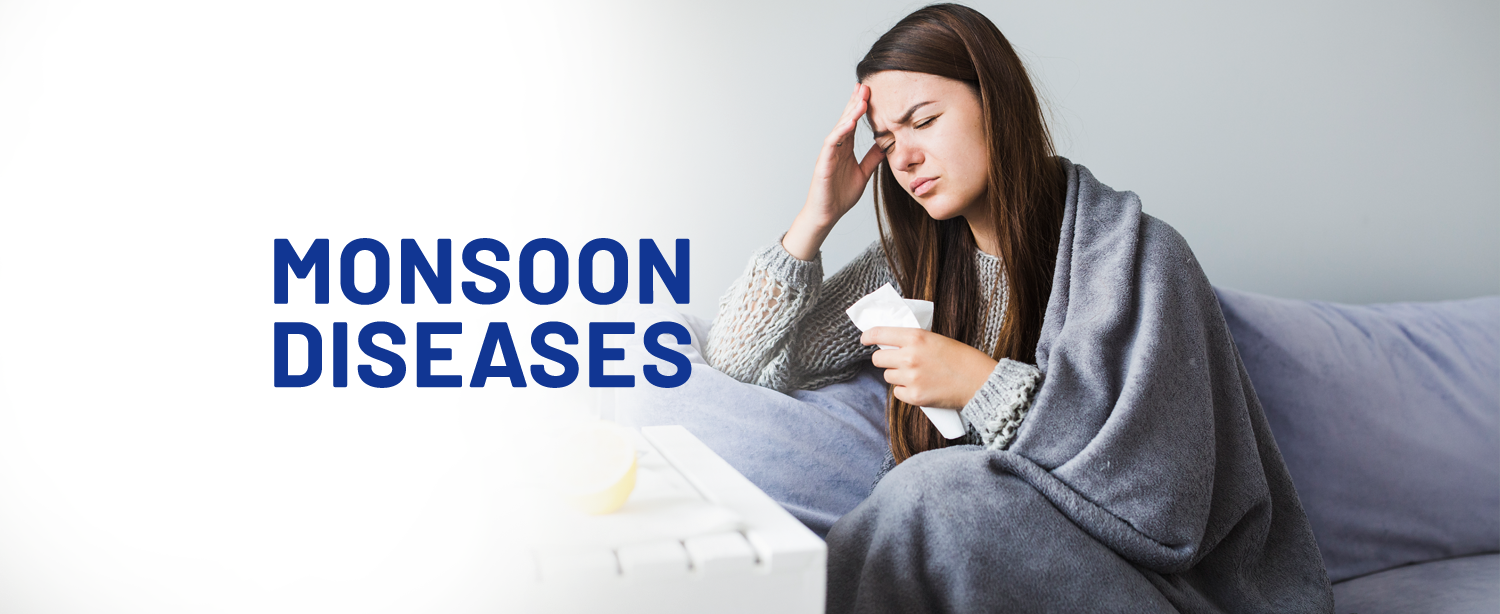The last few months have been difficult for everyone. The world has been struggling to fight a pandemic and learning the rules of the new normal. The norms of personal hygiene, sanitization, and physical distancing has gained importance than ever before. The much-awaited monsoon season has certainly brought joy to many people. Are you looking forward to enjoying a hot cup of tea as you see the raindrops from your window? However this joy is short-lived. This cool season arrives with a swarm of unwanted and harmful viruses and diseases. Cold and cough, malaria, dengue, diarrhoea, fever, typhoid are some of the diseases which are commonly seen in monsoon.
Common Monsoon Diseases
Some of the common monsoon illnesses that are highly infectious and which may also prove life-threatening if not attended to on time.
- Malaria
Malaria, caused by a single-celled parasite called Plasmodium, is one of the major health concerns in India during monsoons. It is the breeding season for mosquitoes (type: Anopheles minimus) that is a host to this malaria-causing parasite. Symptoms include high fever, chills, headache, nausea and vomiting.
- Typhoid
Typhoid fever is a result of contaminated food and water. This is a bacterial infection caused by Salmonella typhi. Maintaining proper hygiene and sanitation and at the same time using clean water is recommended to avoid this infection.
- Chikungunya
Chikungunya, caused by the Aedes albopictus mosquito, is a non-fatal viral disease. These mosquitoes breed in stagnant water and can bite you not only during the night but also during the day. The symptoms include headache, muscle pain, joint swelling, or rashes.
- Dengue
It is caused by a virus that is transmitted by mosquitoes known as the tiger mosquito, which has black and white stripes on their body. Symptoms of dengue include severe joint and muscle pain, swollen lymph nodes, headache, fever, rashes, and exhaustion.
- Cholera
This is a water-borne infection, caused by many strains of bacteria called Vibrio cholera. Cholera affects the gastrointestinal tract causing severe dehydration and diarrhoea. Hence, it is advisable to drink boiled or purified water to keep the germs at bay.
- Viral Fever
Sudden weather change can cause viral fevers. This is highly contagious and it can spread through air and physical contact. The symptoms of this fever are fatigue, chills, body aches, and fever.
- Leptospirosis
The bacteria that cause leptospirosis are spread through the urine of infected animals, which can get into water or soil and can survive there for weeks to months. Avoid walking through flooded waters as this infection enters your body through minor cuts on your skin.
- Cold and cough
The drastic fluctuation of temperature which happens during this rainy season makes the body susceptible to bacterial and viral attacks, resulting in cold and flu. This is the most common form of viral infection. One must consume highly nutritious foods and strengthen your immunity.
- Diarrhoea
Usually, towards the end of summer and early rainy season, seasonal diarrhea is common. This is spread through contaminated food and water. Maintain utmost hygiene while cooking and avoid eating outside food during monsoon.
- Jaundice
Jaundice is a condition wherein the colour of the skin and the eyes turn yellow. It is the cause of increased levels of bilirubin in the bloodstream. Jaundice harms your liver if left untreated.
Preventive Measures
Prevention is better than cure, take these health precautions during monsoon to help prevent the spread of monsoon illnesses. Here are a few health tips:
- Drink safe and clean water.
- Wash vegetables, fruits thoroughly.
- Avoid eating outside food.
- Use mosquito repellents.
- Wear clean and dry garments.
- Use hand sanitizers.
- Use mosquito nets in your house
- Clear stagnant water around your house.
- Maintain high personal hygiene.
Make sure you protect yourself and your family from these dangerous diseases this monsoon season. However, despite your best efforts if you are infected with any monsoon illness please seek medical care. You can visit us or consult our experts online too. For more information please visit www.kokilabenhospital.com


